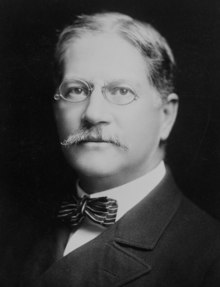Charles H. Allen | |
|---|---|
 Allen in 1902 | |
| Assistant Secretary of the Navy | |
| In office May 11, 1898 – April 21, 1900 | |
| Preceded by | Theodore Roosevelt |
| Succeeded by | Frank W. Hackett |
| Member of the U.S. House of Representatives from Massachusetts's 8th district | |
| In office March 4, 1885 – March 3, 1889 | |
| Preceded by | William A. Russell |
| Succeeded by | Frederic T. Greenhalge |
| Governor of Puerto Rico | |
| In office May 1, 1900 – September 15, 1901 | |
| Appointed by | William McKinley |
| Preceded by | George Whitefield Davis |
| Succeeded by | William Henry Hunt |
| Member of the Massachusetts House of Representatives | |
| In office 1881–1882 | |
| Member of the Massachusetts Senate | |
| In office 1883 | |
| Personal details | |
| Born | Charles Herbert Allen April 15, 1848 Lowell, Massachusetts, US |
| Died | April 20, 1934 (aged 86) Lowell, Massachusetts, US |
| Political party | Republican |
Charles Herbert Allen (April 15, 1848 – April 20, 1934) was an American politician and businessman. After serving in state and federal elected positions, he was appointed as the first United States-appointed civilian governor of Puerto Rico when the U.S. acquired it after the Spanish–American War. He previously had served as Assistant Secretary of the Navy under President William McKinley.
After returning to the U.S. from Puerto Rico, Allen headed for Wall Street and became a vice president of Morton Trust Company and its successor, the Guaranty Trust Company of New York. He formed the American Sugar Refining Company—a sugar syndicate which, by 1907, was the largest in the world. It owned or controlled 98% of the sugar processing capacity in the U.S. and was known as the Sugar Trust.[1][2] Allen was treasurer of American Sugar Refining in 1910, its president in 1913, and in 1915 he joined its board of directors.[3] In the early 21st century, the company is known as Domino Sugar.
- ^ Cesar J. Ayala, American Sugar Kingdom; University of North Carolina Press, 1999; pp. 45–47.
- ^ "Sold Beet Sugar Stock: President Allen Says Sugar Trust Tried to Conform to the Law," New York Times; April 1, 1914.
- ^ "Charles H. Allen Resigns," New York Times, June 16, 1915.